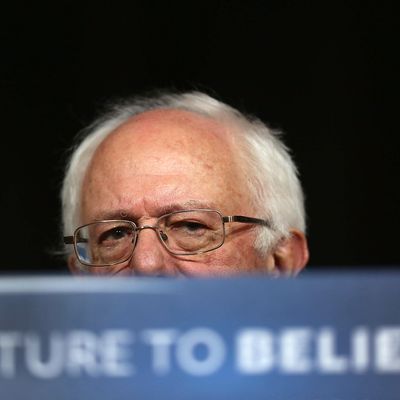
Over the past week, as the national political conversation has focused on the Republican nominee’s apparent affinity for sexual assault, a discussion nearly as tense has been unfolding at the far-left flank of the Democratic Party.
For many of Bernie Sanders’s die-hard supporters, WikiLeaks’ publication of hacked Clinton campaign emails has confirmed their deepest skepticism about and resentment of the Democratic Establishment and the candidate it helped to nominate.
Among other things, the emails revealed that Clinton treated the financial industry with kid gloves in closed-door meetings with Wall Street firms, that the current DNC chair leaked a CNN town-hall question to the Clinton campaign, and that Clinton took a dim view of Sanders’s plans for financial reform.
Among the more recent revelations that are sticking in left-wingers’ craws is an exchange between Clinton speechwriter Dan Schwerin and communications adviser Mandy Grunwald. Per The Independent:
Ms Clinton reportedly told Mr. Schwerin that she wanted to “go after” Mr Sanders on the topic as she considered his Wall Street plan “naive” and “unworkable”, but communications adviser Mandy Grunwald said the better approach was not to “give him a fight”.
“Our polling shows this is one of our weakest areas. Further, our Wall Street approach has always been to agree about the problem, show passion about it, and say we have a better approach to holding the rascals accountable,” she wrote.”We don’t need to prove he’s bad on Wall Street – that’s not really credible. We need to prove we’re ok. Most of all, we don’t want this fight,” she added.
The ostensible grievance here is that Clinton views the reinstatement of Glass-Steagall — an item in the Democratic platform — as naïve and unworkable.
Another missive that’s raising hackles is a March email from former DNC official Mark Siegel in which he advised the Clinton campaign to give Sanders a procedural “win” at the Democratic National Convention.
I think this is terribly important especially with people like Bernie’s sometimes self-righteous ideologues. We want them to go home happy and enthusiastic in working their asses off for Hillary … Why not throw Bernie a bone and reduce the super delegates in the future to the original draft of members of the House and Senate, governors and big city mayors, eliminating the DNC members who are not State chairs or vice-Chairs …
So if we “give” Bernie this in the Convention’s rules committee, his people will think they’ve “won” something from the Party Establishment. And it functionally doesn’t make any difference anyway. They win. We don’t lose. Everyone is happy.
A version of Siegel’s proposal was adopted at the DNC — and celebrated by Clinton and Sanders backers alike.
Other slights are more personal. In one hacked email, a Clinton adviser calls National Nurses United’s attacks on the Democratic front-runner “sanctimonious.” The NNU is one of the few left-leaning unions that has yet to endorse Clinton.
“What the Clinton people called sanctimonious was our effort to act on progressive policies,” RoseAnn DeMoro, the executive director of NNU, told the Washington Post. “What they should do is act like adults, and say yes, we sent these emails. Instead they’re trying to start a new Cold War. She’s going to win this election overwhelmingly. Why don’t they just accept responsibility? It’s the same paradigm as Trump.”
The Democratic left’s onetime champion, however, sees little point in dwelling on spilled emails.
“The job of the progressive movement now is to look forward, not backward,” Bernie Sanders told NBC News Wednesday. “No matter what Secretary Clinton may have said years ago behind closed doors, what’s important today is that millions of people stand up and demand that the Democratic Party implement the most progressive platform in the history of our country.”
The Vermont senator’s viewpoint has much to recommend it. After all, his campaign was initially conceived as a left-wing protest candidacy — which is to say, as a means of pressuring a centrist Democratic front-runner from the left. Sanders’s candidacy was premised on the notion that Clinton was too friendly with the finance industry and would give undue deference to its interests, absent public pressure from the party’s grassroots.
From one angle, then, the leaked excerpts from Clinton’s Wall Street speeches haven’t told Sanders supporters anything they didn’t know. Rather, they confirmed the value and success of his campaign, which pressured a candidate from the party’s center into embracing free public college for the middle class, Social Security expansion, and Medicare buy-in (along with a host of other progressive initiatives generated by the Clinton campaign’s own policy team). To push those policies over the line from public commitments into signed legislation, Sanders argues, his supporters must remain on the Clinton train — albeit as its most disagreeable and demanding passengers.
But while Sanders may have started as a protest candidate, he ended up a genuine — if long-shot — contender for the nomination. And that led his campaign to portray Clinton as irredeemably beholden to Wall Street — not a centrist who could be moved, but a bought-and-paid-for politician whose gestures to economic populism could not be believed. At the same time, Clinton’s campaign and its supporters downplayed — or flatly denied — that there were significant ideological differences between the two candidates. Rather, they suggested that Clinton was merely a “progressive who likes to get things done”; that her disagreement with Sanders was not about the optimal size of government, or whether the finance industry needs to be radically restructured, but solely about the feasibility of his proposals. (At other points, Clinton framed herself as a progressive who had a greater appreciation for the non-economic barriers to success in America).
In this context, emails that merely confirm Clinton’s historic friendliness with finance — and the cool calculation that went into some of her campaign’s concessions to the left — are more likely to inspire a sense of outrage than they otherwise might.






























